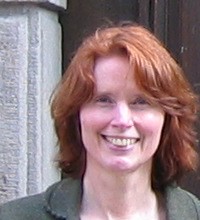In class you looked at your descriptions of places, and we talked about how describing a place can "tell a story" or "make a point" indirectly - like in McPhee's writing. We then looked at some narrative paintings. Most of our discussion was on interpreting what was going on - when I didn't get lost in the pleasure of exploring the paintings - I tried to remember to bring attention back to the
features of the paintings that operated in our interpretations. For example in the first painting that we looked at, the way the woman (nurse) was dressed along with the trash can and the physical set up of the room said "doctor's office" but the picture on the wall, the magazine, the remote + the CD suggested a connection to pornography. Taken together - these clues identified the man at the center of the picture as a sperm donor. In all cases, the titles of the paintings were suggestive.
The point in this exercise was to think about: how descriptions of images, actions, placement, and all the other observable features of a situation might tell your story/convey your feelings & interpretations.
In our discussion your interpretations mentioned:
colors, numbers, size, texture, direction of movement, facial expressions, clothing, lighting, connections between what was there & other situations, actions, what the characters were looking at, what seemed to be at the center, (and I am sure you remember more). Your observations of these features drove your interpretations.
Before writing your blog, do some freewriting, talking, reflecting to identify a subject. If your are hazy about exactly what you want to say, do some more invention writing until you figure out your focus, your focus may be a questions. So deciding to write about your brother is not a focus; deciding to write about sibling rivalry between brothers, about shared your shared identity; about closeness between brothers, etc - is a focus.
Blog 19: Write down your main focus + the points you want to explore in your 4th draft. (I know this is different from what I said in class, but I thought it over and I think it will give you a better basis for feedback this way). Then:
list some scenes, activities, background "facts", places, things, settings, characters that you can describe as a way to open up + present your take on the concept you are exploring. After you make the list - do some writing to develop material what you think of as the 4 or 5 most important or "best" items on your list. At this point, don't worry about how they fit together, but make sure each description/piece of writing makes a particular point for your overall focus.
You can think of this as planning the "picture" you want to present to your reader to interpret. IF you dig into this writing - you should be in good shape to write Draft 4.
In class you will workshop your pre-drafts, so that you can finish them for the next class.
Important reminder: There will be no class on Thursday, November 19.
Have fun and see you in class Monday.
